Neurologist Resume Examples

Jul 18, 2024
|
12 min read
Nailing your neurologist resume: Key tips for a strong brainy impression.
Rated by 348 people
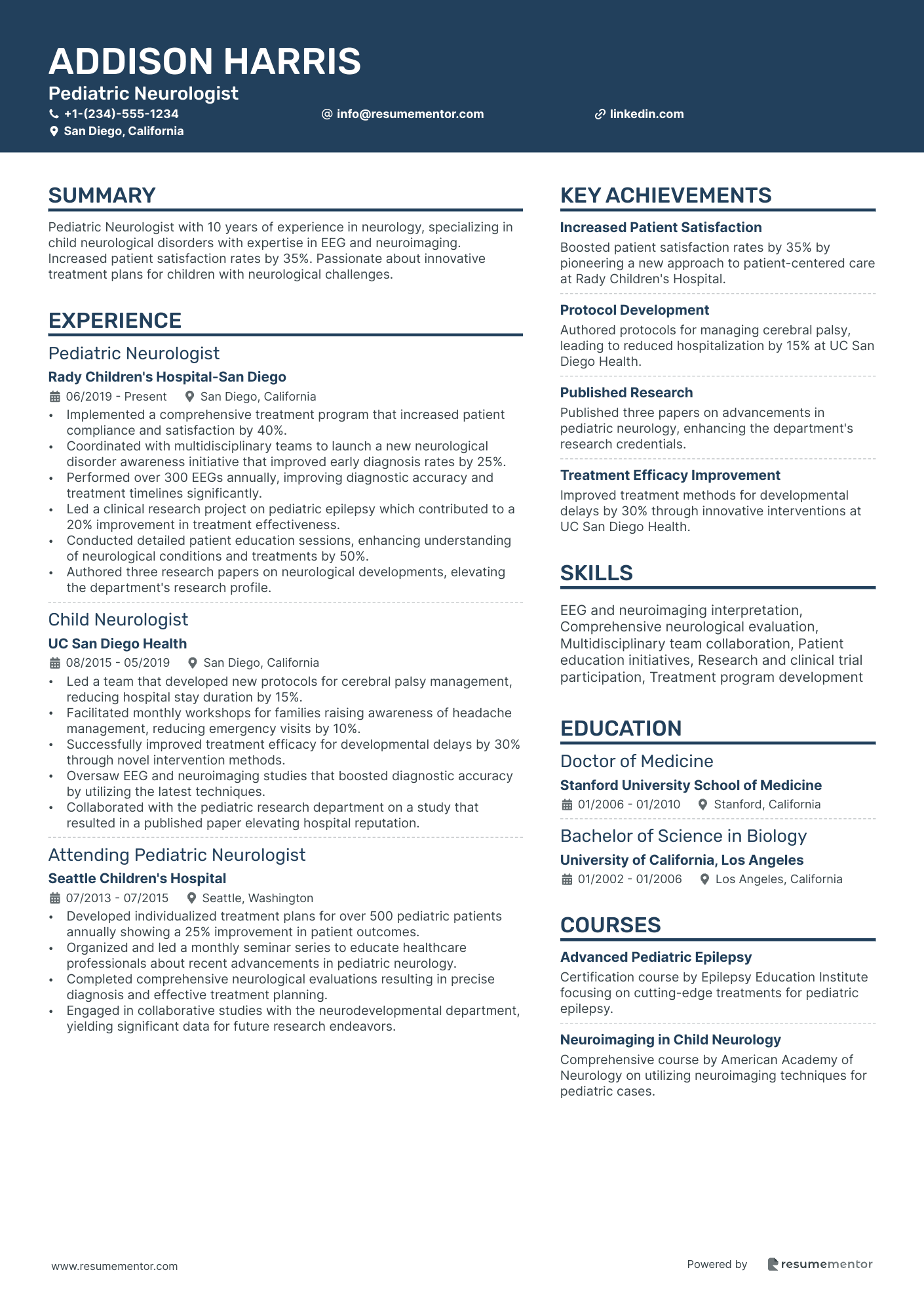
Pediatric Neurologist
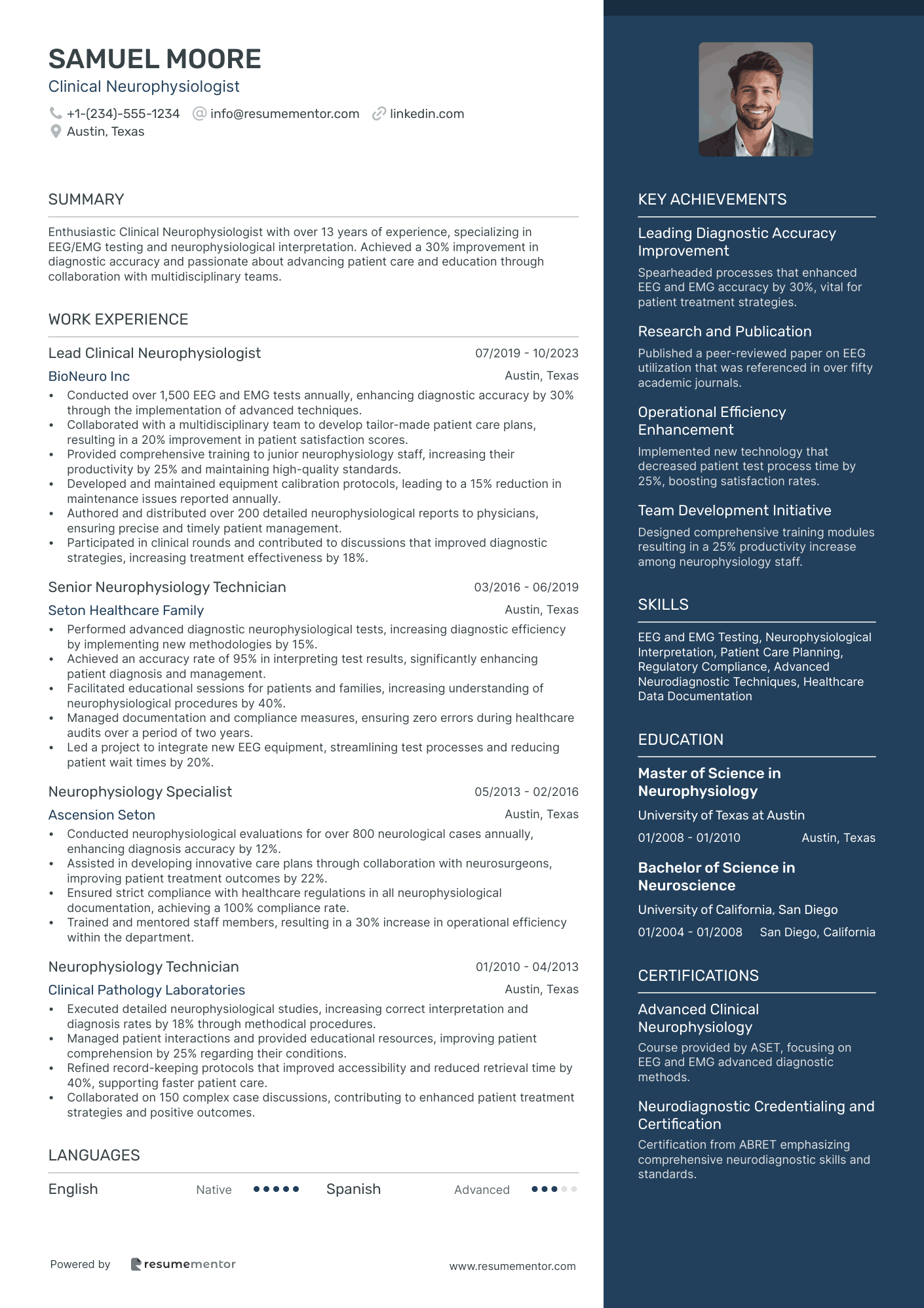
Clinical Neurophysiologist
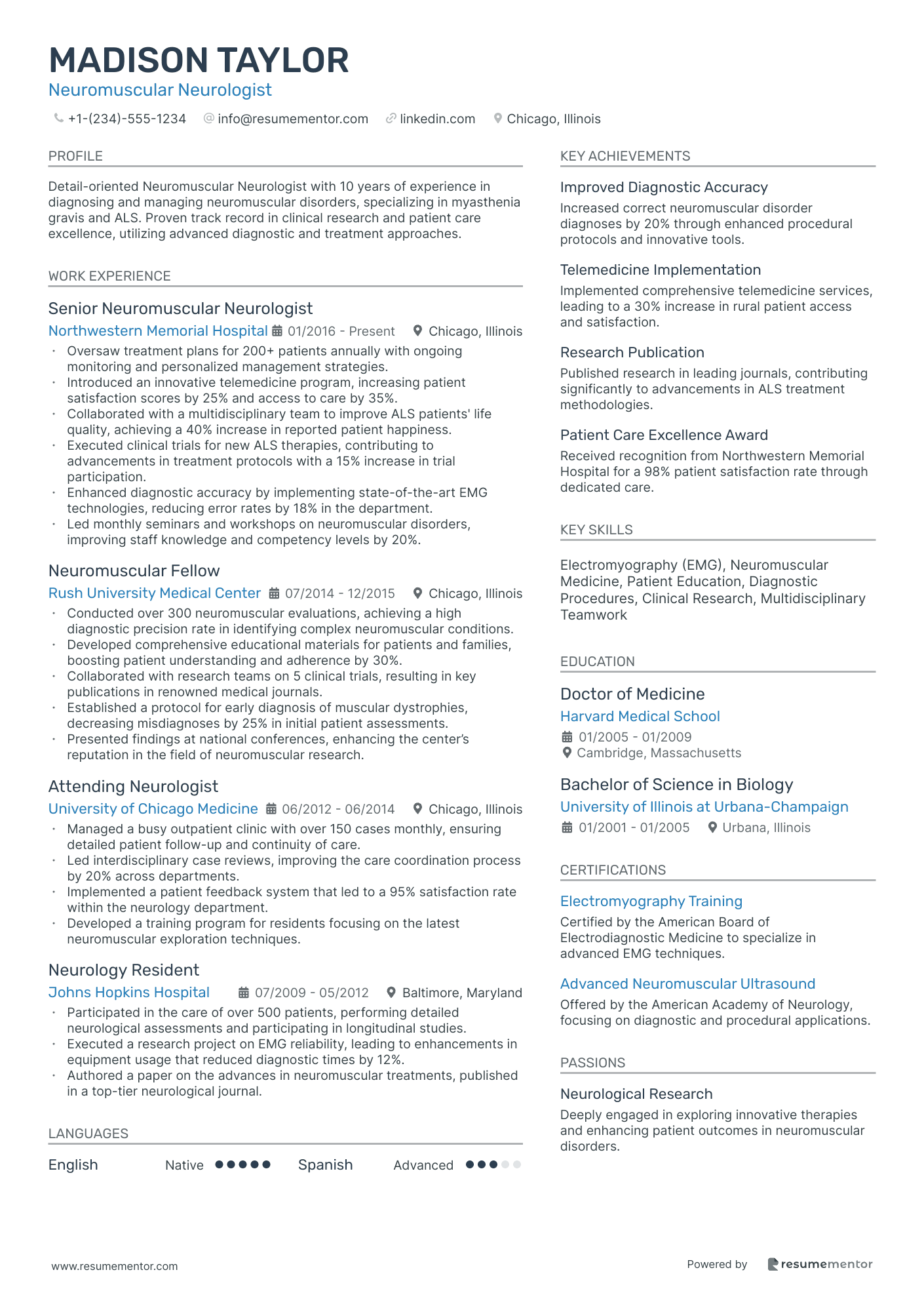
Neuromuscular Neurologist
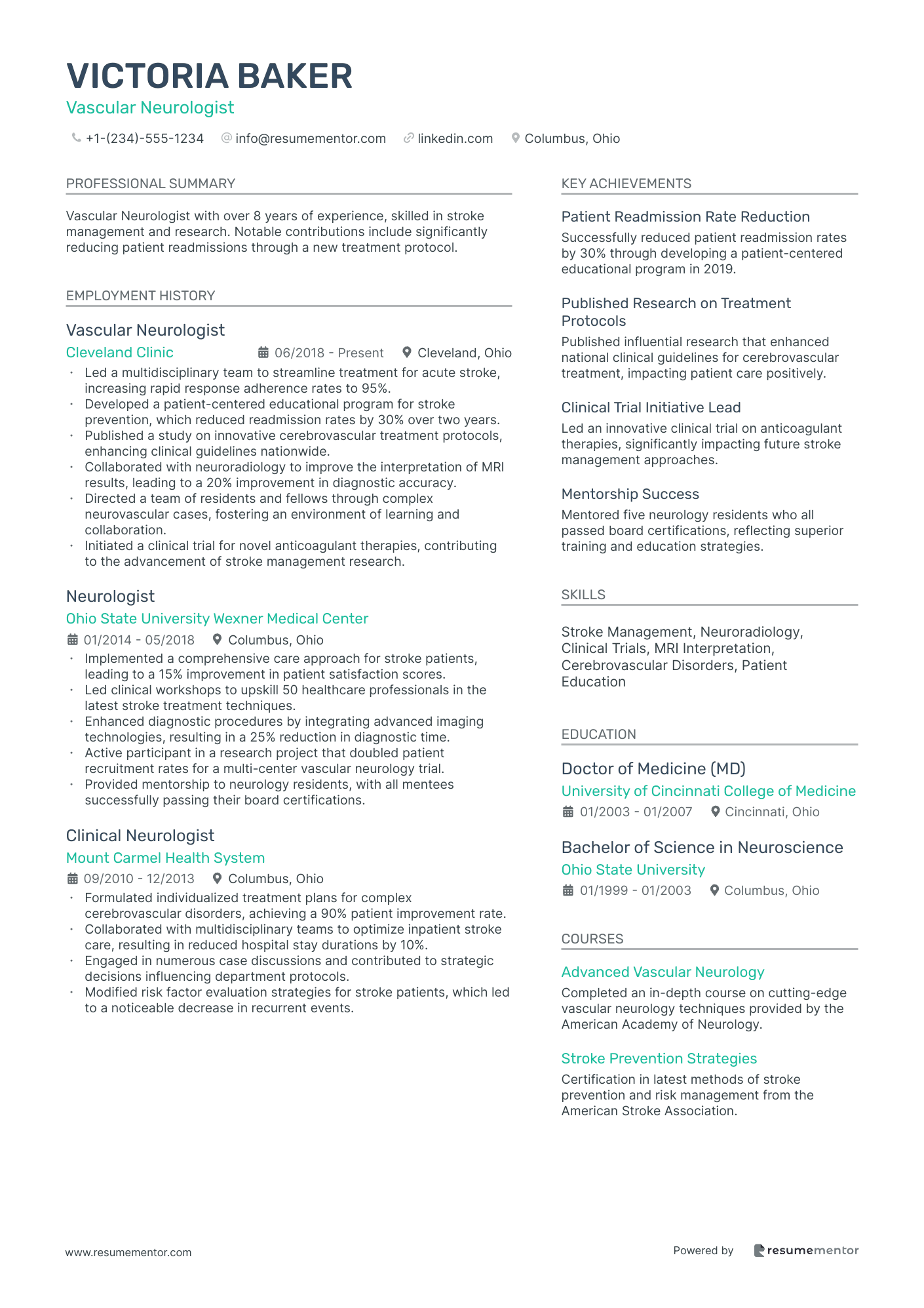
Vascular Neurologist
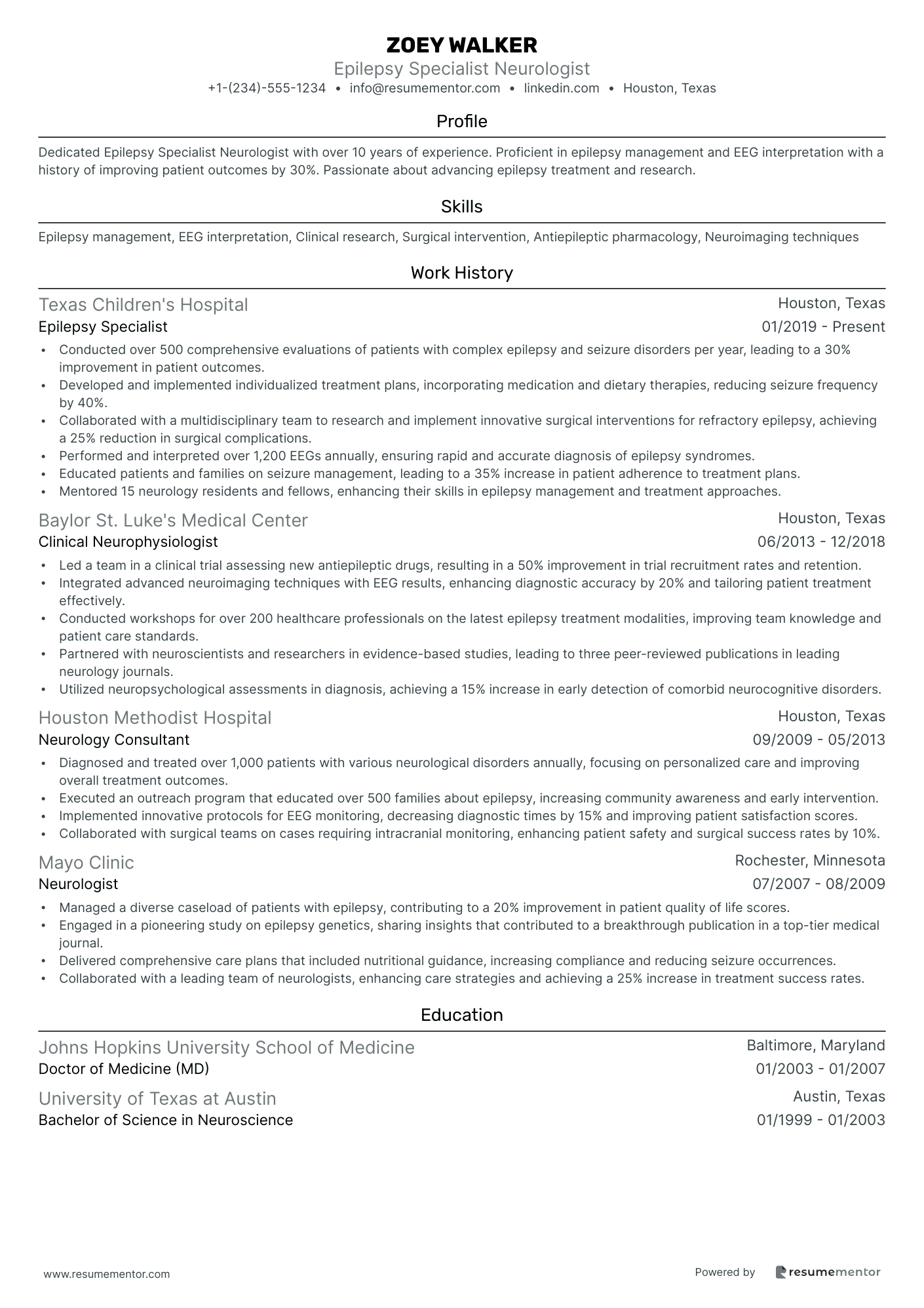
Epilepsy Specialist Neurologist
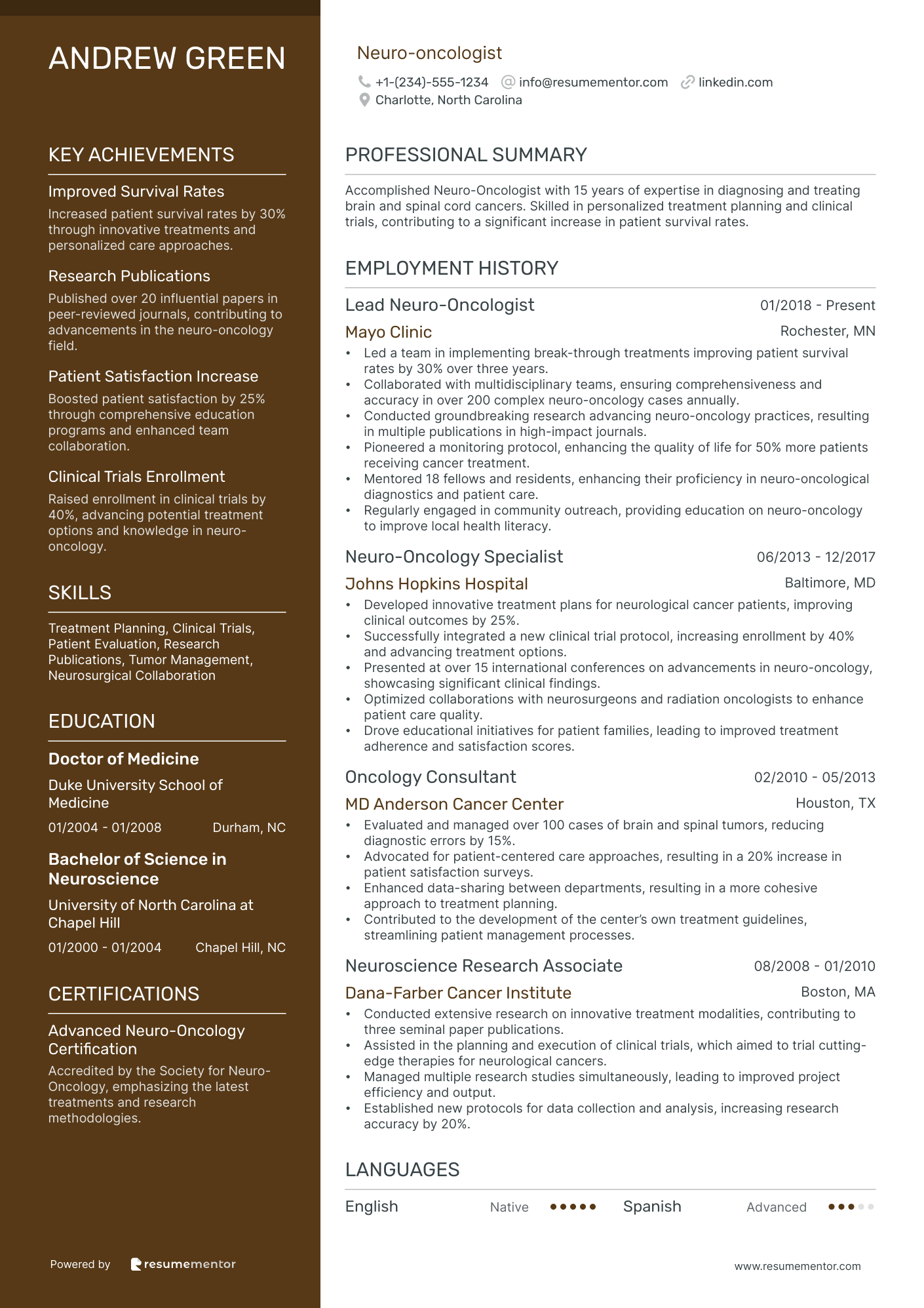
Neuro-oncologist
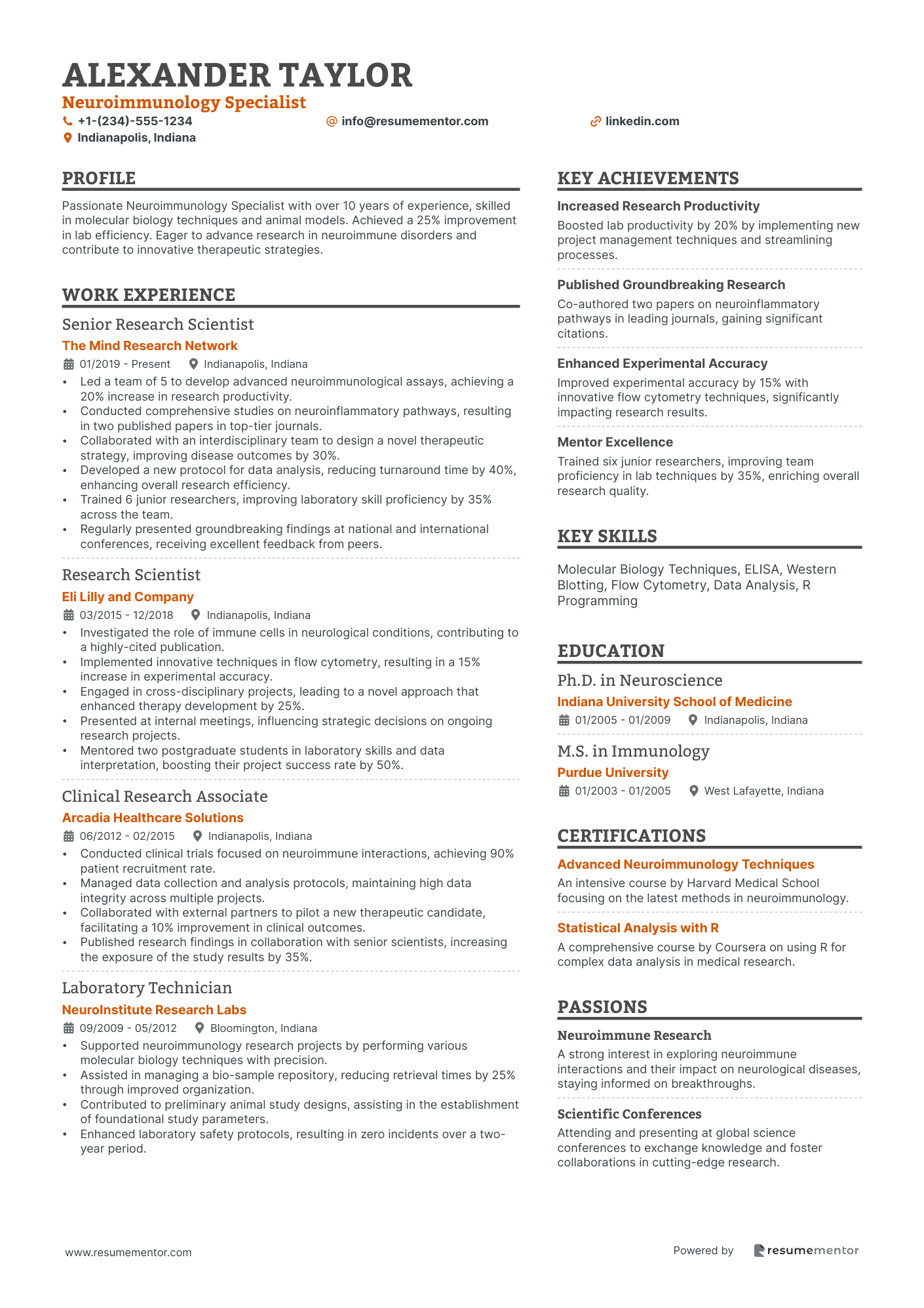
Neuroimmunology Specialist
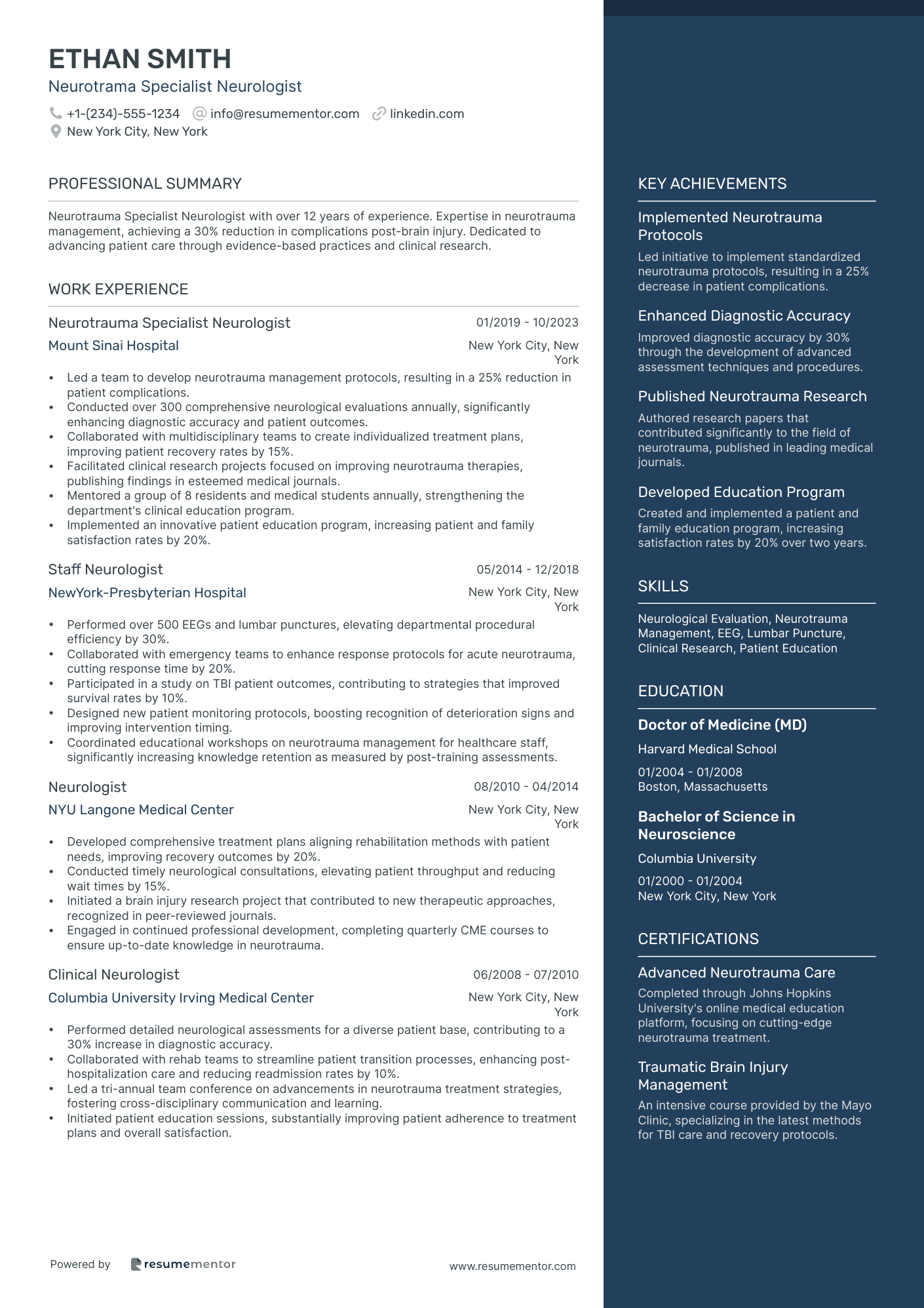
Neurotrama Specialist Neurologist
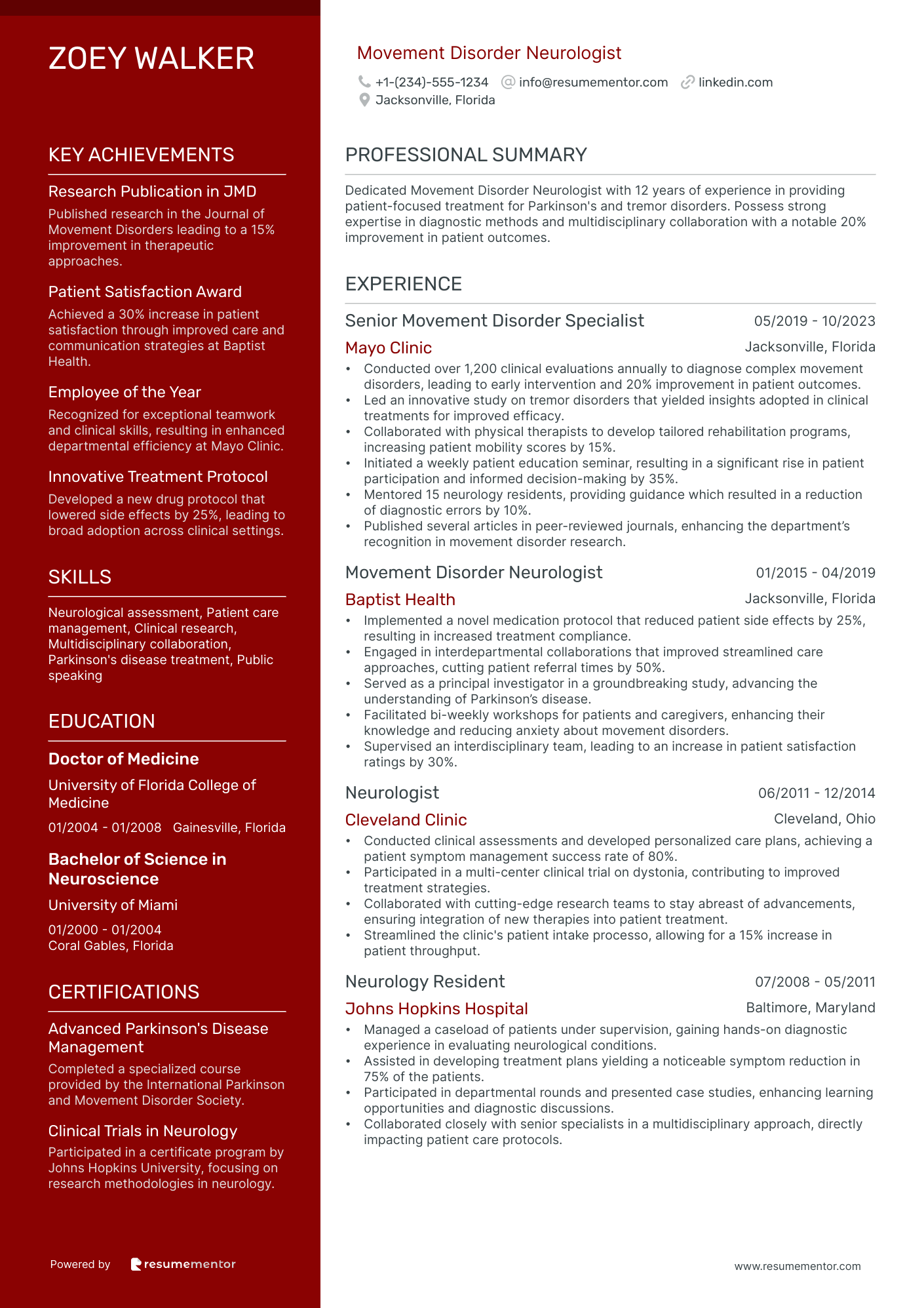
Movement Disorder Neurologist
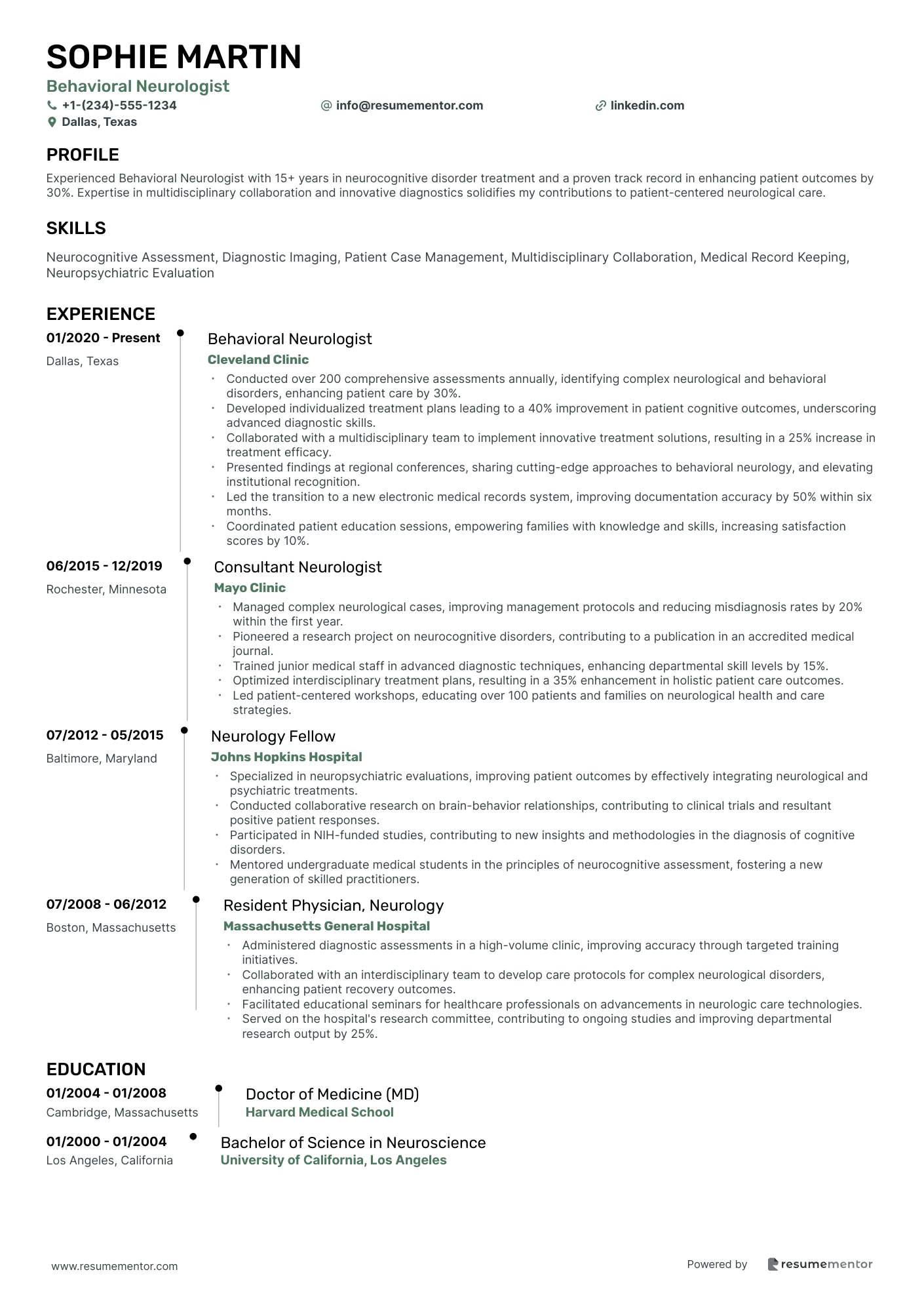
Behavioral Neurologist

Pediatric Neurologist resume sample
- •Implemented a comprehensive treatment program that increased patient compliance and satisfaction by 40%.
- •Coordinated with multidisciplinary teams to launch a new neurological disorder awareness initiative that improved early diagnosis rates by 25%.
- •Performed over 300 EEGs annually, improving diagnostic accuracy and treatment timelines significantly.
- •Led a clinical research project on pediatric epilepsy which contributed to a 20% improvement in treatment effectiveness.
- •Conducted detailed patient education sessions, enhancing understanding of neurological conditions and treatments by 50%.
- •Authored three research papers on neurological developments, elevating the department's research profile.
- •Led a team that developed new protocols for cerebral palsy management, reducing hospital stay duration by 15%.
- •Facilitated monthly workshops for families raising awareness of headache management, reducing emergency visits by 10%.
- •Successfully improved treatment efficacy for developmental delays by 30% through novel intervention methods.
- •Oversaw EEG and neuroimaging studies that boosted diagnostic accuracy by utilizing the latest techniques.
- •Collaborated with the pediatric research department on a study that resulted in a published paper elevating hospital reputation.
- •Developed individualized treatment plans for over 500 pediatric patients annually showing a 25% improvement in patient outcomes.
- •Organized and led a monthly seminar series to educate healthcare professionals about recent advancements in pediatric neurology.
- •Completed comprehensive neurological evaluations resulting in precise diagnosis and effective treatment planning.
- •Engaged in collaborative studies with the neurodevelopmental department, yielding significant data for future research endeavors.
- •Executed a research project on epilepsy in children resulting in a new approach to treatment reducing seizure frequency by 30%.
- •Contributed to the design and implementation of a patient-centered care clinic increasing patient throughput by 20%.
- •Participated in multidisciplinary rounds which improved coordination of care and reduced patient admission time.
- •Assisted in conducting EEG studies contributing to the department's increase in diagnostic efficiency by 15%.
Clinical Neurophysiologist resume sample
- •Conducted over 1,500 EEG and EMG tests annually, enhancing diagnostic accuracy by 30% through the implementation of advanced techniques.
- •Collaborated with a multidisciplinary team to develop tailor-made patient care plans, resulting in a 20% improvement in patient satisfaction scores.
- •Provided comprehensive training to junior neurophysiology staff, increasing their productivity by 25% and maintaining high-quality standards.
- •Developed and maintained equipment calibration protocols, leading to a 15% reduction in maintenance issues reported annually.
- •Authored and distributed over 200 detailed neurophysiological reports to physicians, ensuring precise and timely patient management.
- •Participated in clinical rounds and contributed to discussions that improved diagnostic strategies, increasing treatment effectiveness by 18%.
- •Performed advanced diagnostic neurophysiological tests, increasing diagnostic efficiency by implementing new methodologies by 15%.
- •Achieved an accuracy rate of 95% in interpreting test results, significantly enhancing patient diagnosis and management.
- •Facilitated educational sessions for patients and families, increasing understanding of neurophysiological procedures by 40%.
- •Managed documentation and compliance measures, ensuring zero errors during healthcare audits over a period of two years.
- •Led a project to integrate new EEG equipment, streamlining test processes and reducing patient wait times by 20%.
- •Conducted neurophysiological evaluations for over 800 neurological cases annually, enhancing diagnosis accuracy by 12%.
- •Assisted in developing innovative care plans through collaboration with neurosurgeons, improving patient treatment outcomes by 22%.
- •Ensured strict compliance with healthcare regulations in all neurophysiological documentation, achieving a 100% compliance rate.
- •Trained and mentored staff members, resulting in a 30% increase in operational efficiency within the department.
- •Executed detailed neurophysiological studies, increasing correct interpretation and diagnosis rates by 18% through methodical procedures.
- •Managed patient interactions and provided educational resources, improving patient comprehension by 25% regarding their conditions.
- •Refined record-keeping protocols that improved accessibility and reduced retrieval time by 40%, supporting faster patient care.
- •Collaborated on 150 complex case discussions, contributing to enhanced patient treatment strategies and positive outcomes.
Neuromuscular Neurologist resume sample
- •Oversaw treatment plans for 200+ patients annually with ongoing monitoring and personalized management strategies.
- •Introduced an innovative telemedicine program, increasing patient satisfaction scores by 25% and access to care by 35%.
- •Collaborated with a multidisciplinary team to improve ALS patients' life quality, achieving a 40% increase in reported patient happiness.
- •Executed clinical trials for new ALS therapies, contributing to advancements in treatment protocols with a 15% increase in trial participation.
- •Enhanced diagnostic accuracy by implementing state-of-the-art EMG technologies, reducing error rates by 18% in the department.
- •Led monthly seminars and workshops on neuromuscular disorders, improving staff knowledge and competency levels by 20%.
- •Conducted over 300 neuromuscular evaluations, achieving a high diagnostic precision rate in identifying complex neuromuscular conditions.
- •Developed comprehensive educational materials for patients and families, boosting patient understanding and adherence by 30%.
- •Collaborated with research teams on 5 clinical trials, resulting in key publications in renowned medical journals.
- •Established a protocol for early diagnosis of muscular dystrophies, decreasing misdiagnoses by 25% in initial patient assessments.
- •Presented findings at national conferences, enhancing the center’s reputation in the field of neuromuscular research.
- •Managed a busy outpatient clinic with over 150 cases monthly, ensuring detailed patient follow-up and continuity of care.
- •Led interdisciplinary case reviews, improving the care coordination process by 20% across departments.
- •Implemented a patient feedback system that led to a 95% satisfaction rate within the neurology department.
- •Developed a training program for residents focusing on the latest neuromuscular exploration techniques.
- •Participated in the care of over 500 patients, performing detailed neurological assessments and participating in longitudinal studies.
- •Executed a research project on EMG reliability, leading to enhancements in equipment usage that reduced diagnostic times by 12%.
- •Authored a paper on the advances in neuromuscular treatments, published in a top-tier neurological journal.
Vascular Neurologist resume sample
- •Led a multidisciplinary team to streamline treatment for acute stroke, increasing rapid response adherence rates to 95%.
- •Developed a patient-centered educational program for stroke prevention, which reduced readmission rates by 30% over two years.
- •Published a study on innovative cerebrovascular treatment protocols, enhancing clinical guidelines nationwide.
- •Collaborated with neuroradiology to improve the interpretation of MRI results, leading to a 20% improvement in diagnostic accuracy.
- •Directed a team of residents and fellows through complex neurovascular cases, fostering an environment of learning and collaboration.
- •Initiated a clinical trial for novel anticoagulant therapies, contributing to the advancement of stroke management research.
- •Implemented a comprehensive care approach for stroke patients, leading to a 15% improvement in patient satisfaction scores.
- •Led clinical workshops to upskill 50 healthcare professionals in the latest stroke treatment techniques.
- •Enhanced diagnostic procedures by integrating advanced imaging technologies, resulting in a 25% reduction in diagnostic time.
- •Active participant in a research project that doubled patient recruitment rates for a multi-center vascular neurology trial.
- •Provided mentorship to neurology residents, with all mentees successfully passing their board certifications.
- •Formulated individualized treatment plans for complex cerebrovascular disorders, achieving a 90% patient improvement rate.
- •Collaborated with multidisciplinary teams to optimize inpatient stroke care, resulting in reduced hospital stay durations by 10%.
- •Engaged in numerous case discussions and contributed to strategic decisions influencing department protocols.
- •Modified risk factor evaluation strategies for stroke patients, which led to a noticeable decrease in recurrent events.
- •Assisted in the development of pediatric stroke management protocols, elevating care standards within the hospital.
- •Successfully conducted over 200 neurological exams, contributing to timely and accurate diagnosis of pediatric patients.
- •Collaborated with diverse teams to execute a community outreach program, improving local stroke awareness and education.
- •Participated in department meetings to devise strategies enhancing pediatric neurological care, fostering an innovative care approach.
Epilepsy Specialist Neurologist resume sample
- •Conducted over 500 comprehensive evaluations of patients with complex epilepsy and seizure disorders per year, leading to a 30% improvement in patient outcomes.
- •Developed and implemented individualized treatment plans, incorporating medication and dietary therapies, reducing seizure frequency by 40%.
- •Collaborated with a multidisciplinary team to research and implement innovative surgical interventions for refractory epilepsy, achieving a 25% reduction in surgical complications.
- •Performed and interpreted over 1,200 EEGs annually, ensuring rapid and accurate diagnosis of epilepsy syndromes.
- •Educated patients and families on seizure management, leading to a 35% increase in patient adherence to treatment plans.
- •Mentored 15 neurology residents and fellows, enhancing their skills in epilepsy management and treatment approaches.
- •Led a team in a clinical trial assessing new antiepileptic drugs, resulting in a 50% improvement in trial recruitment rates and retention.
- •Integrated advanced neuroimaging techniques with EEG results, enhancing diagnostic accuracy by 20% and tailoring patient treatment effectively.
- •Conducted workshops for over 200 healthcare professionals on the latest epilepsy treatment modalities, improving team knowledge and patient care standards.
- •Partnered with neuroscientists and researchers in evidence-based studies, leading to three peer-reviewed publications in leading neurology journals.
- •Utilized neuropsychological assessments in diagnosis, achieving a 15% increase in early detection of comorbid neurocognitive disorders.
- •Diagnosed and treated over 1,000 patients with various neurological disorders annually, focusing on personalized care and improving overall treatment outcomes.
- •Executed an outreach program that educated over 500 families about epilepsy, increasing community awareness and early intervention.
- •Implemented innovative protocols for EEG monitoring, decreasing diagnostic times by 15% and improving patient satisfaction scores.
- •Collaborated with surgical teams on cases requiring intracranial monitoring, enhancing patient safety and surgical success rates by 10%.
- •Managed a diverse caseload of patients with epilepsy, contributing to a 20% improvement in patient quality of life scores.
- •Engaged in a pioneering study on epilepsy genetics, sharing insights that contributed to a breakthrough publication in a top-tier medical journal.
- •Delivered comprehensive care plans that included nutritional guidance, increasing compliance and reducing seizure occurrences.
- •Collaborated with a leading team of neurologists, enhancing care strategies and achieving a 25% increase in treatment success rates.
Neuro-oncologist resume sample
- •Led a team in implementing break-through treatments improving patient survival rates by 30% over three years.
- •Collaborated with multidisciplinary teams, ensuring comprehensiveness and accuracy in over 200 complex neuro-oncology cases annually.
- •Conducted groundbreaking research advancing neuro-oncology practices, resulting in multiple publications in high-impact journals.
- •Pioneered a monitoring protocol, enhancing the quality of life for 50% more patients receiving cancer treatment.
- •Mentored 18 fellows and residents, enhancing their proficiency in neuro-oncological diagnostics and patient care.
- •Regularly engaged in community outreach, providing education on neuro-oncology to improve local health literacy.
- •Developed innovative treatment plans for neurological cancer patients, improving clinical outcomes by 25%.
- •Successfully integrated a new clinical trial protocol, increasing enrollment by 40% and advancing treatment options.
- •Presented at over 15 international conferences on advancements in neuro-oncology, showcasing significant clinical findings.
- •Optimized collaborations with neurosurgeons and radiation oncologists to enhance patient care quality.
- •Drove educational initiatives for patient families, leading to improved treatment adherence and satisfaction scores.
- •Evaluated and managed over 100 cases of brain and spinal tumors, reducing diagnostic errors by 15%.
- •Advocated for patient-centered care approaches, resulting in a 20% increase in patient satisfaction surveys.
- •Enhanced data-sharing between departments, resulting in a more cohesive approach to treatment planning.
- •Contributed to the development of the center’s own treatment guidelines, streamlining patient management processes.
- •Conducted extensive research on innovative treatment modalities, contributing to three seminal paper publications.
- •Assisted in the planning and execution of clinical trials, which aimed to trial cutting-edge therapies for neurological cancers.
- •Managed multiple research studies simultaneously, leading to improved project efficiency and output.
- •Established new protocols for data collection and analysis, increasing research accuracy by 20%.
Neuroimmunology Specialist resume sample
- •Led a team of 5 to develop advanced neuroimmunological assays, achieving a 20% increase in research productivity.
- •Conducted comprehensive studies on neuroinflammatory pathways, resulting in two published papers in top-tier journals.
- •Collaborated with an interdisciplinary team to design a novel therapeutic strategy, improving disease outcomes by 30%.
- •Developed a new protocol for data analysis, reducing turnaround time by 40%, enhancing overall research efficiency.
- •Trained 6 junior researchers, improving laboratory skill proficiency by 35% across the team.
- •Regularly presented groundbreaking findings at national and international conferences, receiving excellent feedback from peers.
- •Investigated the role of immune cells in neurological conditions, contributing to a highly-cited publication.
- •Implemented innovative techniques in flow cytometry, resulting in a 15% increase in experimental accuracy.
- •Engaged in cross-disciplinary projects, leading to a novel approach that enhanced therapy development by 25%.
- •Presented at internal meetings, influencing strategic decisions on ongoing research projects.
- •Mentored two postgraduate students in laboratory skills and data interpretation, boosting their project success rate by 50%.
- •Conducted clinical trials focused on neuroimmune interactions, achieving 90% patient recruitment rate.
- •Managed data collection and analysis protocols, maintaining high data integrity across multiple projects.
- •Collaborated with external partners to pilot a new therapeutic candidate, facilitating a 10% improvement in clinical outcomes.
- •Published research findings in collaboration with senior scientists, increasing the exposure of the study results by 35%.
- •Supported neuroimmunology research projects by performing various molecular biology techniques with precision.
- •Assisted in managing a bio-sample repository, reducing retrieval times by 25% through improved organization.
- •Contributed to preliminary animal study designs, assisting in the establishment of foundational study parameters.
- •Enhanced laboratory safety protocols, resulting in zero incidents over a two-year period.
Neurotrama Specialist Neurologist resume sample
- •Led a team to develop neurotrauma management protocols, resulting in a 25% reduction in patient complications.
- •Conducted over 300 comprehensive neurological evaluations annually, significantly enhancing diagnostic accuracy and patient outcomes.
- •Collaborated with multidisciplinary teams to create individualized treatment plans, improving patient recovery rates by 15%.
- •Facilitated clinical research projects focused on improving neurotrauma therapies, publishing findings in esteemed medical journals.
- •Mentored a group of 8 residents and medical students annually, strengthening the department's clinical education program.
- •Implemented an innovative patient education program, increasing patient and family satisfaction rates by 20%.
- •Performed over 500 EEGs and lumbar punctures, elevating departmental procedural efficiency by 30%.
- •Collaborated with emergency teams to enhance response protocols for acute neurotrauma, cutting response time by 20%.
- •Participated in a study on TBI patient outcomes, contributing to strategies that improved survival rates by 10%.
- •Designed new patient monitoring protocols, boosting recognition of deterioration signs and improving intervention timing.
- •Coordinated educational workshops on neurotrauma management for healthcare staff, significantly increasing knowledge retention as measured by post-training assessments.
- •Developed comprehensive treatment plans aligning rehabilitation methods with patient needs, improving recovery outcomes by 20%.
- •Conducted timely neurological consultations, elevating patient throughput and reducing wait times by 15%.
- •Initiated a brain injury research project that contributed to new therapeutic approaches, recognized in peer-reviewed journals.
- •Engaged in continued professional development, completing quarterly CME courses to ensure up-to-date knowledge in neurotrauma.
- •Performed detailed neurological assessments for a diverse patient base, contributing to a 30% increase in diagnostic accuracy.
- •Collaborated with rehab teams to streamline patient transition processes, enhancing post-hospitalization care and reducing readmission rates by 10%.
- •Led a tri-annual team conference on advancements in neurotrauma treatment strategies, fostering cross-disciplinary communication and learning.
- •Initiated patient education sessions, substantially improving patient adherence to treatment plans and overall satisfaction.
Movement Disorder Neurologist resume sample
- •Conducted over 1,200 clinical evaluations annually to diagnose complex movement disorders, leading to early intervention and 20% improvement in patient outcomes.
- •Led an innovative study on tremor disorders that yielded insights adopted in clinical treatments for improved efficacy.
- •Collaborated with physical therapists to develop tailored rehabilitation programs, increasing patient mobility scores by 15%.
- •Initiated a weekly patient education seminar, resulting in a significant rise in patient participation and informed decision-making by 35%.
- •Mentored 15 neurology residents, providing guidance which resulted in a reduction of diagnostic errors by 10%.
- •Published several articles in peer-reviewed journals, enhancing the department’s recognition in movement disorder research.
- •Implemented a novel medication protocol that reduced patient side effects by 25%, resulting in increased treatment compliance.
- •Engaged in interdepartmental collaborations that improved streamlined care approaches, cutting patient referral times by 50%.
- •Served as a principal investigator in a groundbreaking study, advancing the understanding of Parkinson’s disease.
- •Facilitated bi-weekly workshops for patients and caregivers, enhancing their knowledge and reducing anxiety about movement disorders.
- •Supervised an interdisciplinary team, leading to an increase in patient satisfaction ratings by 30%.
- •Conducted clinical assessments and developed personalized care plans, achieving a patient symptom management success rate of 80%.
- •Participated in a multi-center clinical trial on dystonia, contributing to improved treatment strategies.
- •Collaborated with cutting-edge research teams to stay abreast of advancements, ensuring integration of new therapies into patient treatment.
- •Streamlined the clinic's patient intake processo, allowing for a 15% increase in patient throughput.
- •Managed a caseload of patients under supervision, gaining hands-on diagnostic experience in evaluating neurological conditions.
- •Assisted in developing treatment plans yielding a noticeable symptom reduction in 75% of the patients.
- •Participated in departmental rounds and presented case studies, enhancing learning opportunities and diagnostic discussions.
- •Collaborated closely with senior specialists in a multidisciplinary approach, directly impacting patient care protocols.
Behavioral Neurologist resume sample
- •Conducted over 200 comprehensive assessments annually, identifying complex neurological and behavioral disorders, enhancing patient care by 30%.
- •Developed individualized treatment plans leading to a 40% improvement in patient cognitive outcomes, underscoring advanced diagnostic skills.
- •Collaborated with a multidisciplinary team to implement innovative treatment solutions, resulting in a 25% increase in treatment efficacy.
- •Presented findings at regional conferences, sharing cutting-edge approaches to behavioral neurology, and elevating institutional recognition.
- •Led the transition to a new electronic medical records system, improving documentation accuracy by 50% within six months.
- •Coordinated patient education sessions, empowering families with knowledge and skills, increasing satisfaction scores by 10%.
- •Managed complex neurological cases, improving management protocols and reducing misdiagnosis rates by 20% within the first year.
- •Pioneered a research project on neurocognitive disorders, contributing to a publication in an accredited medical journal.
- •Trained junior medical staff in advanced diagnostic techniques, enhancing departmental skill levels by 15%.
- •Optimized interdisciplinary treatment plans, resulting in a 35% enhancement in holistic patient care outcomes.
- •Led patient-centered workshops, educating over 100 patients and families on neurological health and care strategies.
- •Specialized in neuropsychiatric evaluations, improving patient outcomes by effectively integrating neurological and psychiatric treatments.
- •Conducted collaborative research on brain-behavior relationships, contributing to clinical trials and resultant positive patient responses.
- •Participated in NIH-funded studies, contributing to new insights and methodologies in the diagnosis of cognitive disorders.
- •Mentored undergraduate medical students in the principles of neurocognitive assessment, fostering a new generation of skilled practitioners.
- •Administered diagnostic assessments in a high-volume clinic, improving accuracy through targeted training initiatives.
- •Collaborated with an interdisciplinary team to develop care protocols for complex neurological disorders, enhancing patient recovery outcomes.
- •Facilitated educational seminars for healthcare professionals on advancements in neurologic care technologies.
- •Served on the hospital's research committee, contributing to ongoing studies and improving departmental research output by 25%.
Crafting a standout neurologist resume is like navigating the intricate pathways of the brain—every detail must align perfectly to create a cohesive narrative. Your vast medical expertise is invaluable, yet translating this onto paper can feel overwhelming, much like simplifying a complex diagnosis. Finding the balance between highlighting your achievements and maintaining readability is crucial to your success.
Updating a resume may seem as challenging as diagnosing a tricky condition, but it becomes more manageable with the right tools. Using a resume template can streamline this process by organizing your experiences and skills logically. Find a suitable template here, which will help guide the hiring manager through your professional journey with ease.
Your goal is to highlight your mastery in neurological procedures while also showcasing your research contributions. Your resume should reflect your professional persona and patient care philosophy seamlessly. A clear and well-structured resume leaves a lasting impression, much like the impact of your work in the clinic.
With a strategic layout, you can focus attention on your most significant achievements, ensuring a smooth advancement in your career. This approach reduces unnecessary stress, allowing you to confidently present your qualifications and expertise.
Key Takeaways
- To create an effective neurologist resume, focus on highlighting your expertise in neurological procedures and research contributions while ensuring a clear structure that reflects your professional persona.
- Use a chronological resume format to best showcase your career progression and experience, and choose a modern, professional font to maintain a polished appearance.
- Ensure your resume is saved as a PDF to maintain consistent formatting across different devices and include one-inch margins for a clean and organized look.
- In the experience section, use clear structure and strong action words to demonstrate achievements and relevant roles from the past 10-15 years, tailoring it to match the job ad.
- A well-rounded resume includes additional sections such as language skills, volunteer work, and publications to demonstrate a diverse and comprehensive skill set.
What to focus on when writing your neurologist resume
A neurologist's resume should clearly communicate your expertise in neurological care, showcasing your ability to diagnose and treat nervous system disorders while emphasizing your commitment to patient well-being. It should highlight your experience with advanced medical technologies and your dedication to continuous learning for improved patient outcomes.
How to structure your neurologist resume
- Contact Information — Start with your full name, phone number, email address, and LinkedIn profile to ensure easy connectivity, making sure it's formatted for easy reading by an ATS system. This section is your first point of engagement with recruiters, so it must be clear and professional.
- Professional Summary — In this section, capture your years of experience and key skills. Mention the type of neurology practice you excel in, such as pediatric or neuro-oncology, setting the stage for what makes you a valuable addition to a medical team. Express your passion for neurology and how it drives your career goals.
- Medical Experience — Build on this by detailing your work history. Focus on specific roles, responsibilities, and achievements in neurology, especially any specialty work or notable patient cases that demonstrate your capability and dedication. Highlighting these aspects shows your hands-on expertise and commitment to patient care.
- Education — Follow up with your educational background. List your degrees from most recent to oldest, including any post-doctoral fellowships or residencies centered on neurology, which underpin your qualifications. This demonstrates a solid foundation and specialization in your field.
- Certifications and Licensure — Complement your education with a list of your board certifications and any state-specific licenses that authorize you to practice neurology, reinforcing your authority in the field. These credentials are crucial for establishing your credibility and legal standing.
- Skills — Finally, emphasize your neurological skills, such as proficiency in electromyography, EEG interpretation, and neurosurgical assistance. Highlight your problem-solving abilities and your knack for patient interaction, solidifying your comprehensive skill set.
We’ll explore each of these sections more in-depth below to ensure your resume is as robust and compelling as possible.
Which resume format to choose
Crafting an effective neurologist resume requires attention to both content structure and presentation style to truly reflect your expertise in the field. Start with a chronological format, as it naturally highlights your career progression and experience. This approach lets potential employers see your journey and growth, crucial in a field where experience and reputation are everything.
Choosing the right font also plays a significant role in presentation. Consider opting for Rubik, Lato, or Montserrat. These modern fonts provide a clean and professional look without distracting from the core content. They help maintain focus on your qualifications and achievements, contributing to a polished overall appearance.
Saving your resume as a PDF is essential. This file format ensures your carefully crafted resume maintains its formatting across various devices and operating systems. In a setting like a hospital or clinic, where multiple staff members might view your application, maintaining a consistent appearance is vital.
Don't overlook the layout, either—keeping margins at one inch on all sides gives your resume a clean, organized look. This spacing is crucial as it prevents your resume from looking cluttered and allows your accomplishments to stand out, making it easier for hiring managers to quickly identify key information.
By integrating these thoughtful choices, your resume will effectively communicate your professional journey and leave a lasting impression with its clarity and design.
How to write a quantifiable resume experience section
A neurologist's resume should have a powerful experience section that highlights achievements and responsibilities, showing the impact you’ve made in your career. Start with your most recent position and work backward, covering the last 10-15 years with a focus on relevant roles. Demonstrating your skills and contributions through clear structure is critical; include your job title, workplace, location, and dates to provide context. Tailoring your resume to the job ad is crucial; match your skills and accomplishments with what the employer is seeking to emphasize your fit for the role. Use strong action words like "developed," "improved," "implemented," and "collaborated" to illustrate your proactive contributions and leadership. Here’s a concise example:
- •Led a team of 10 in reducing neurological diagnostic time by 30% through innovative imaging techniques.
- •Increased patient satisfaction scores by 25% through personalized treatment plans and follow-up care.
- •Implemented a telemedicine program, which grew departmental patient reach by 40% in rural areas.
- •Authored 5 peer-reviewed research papers on neural imaging, enhancing department's research capabilities.
This experience section effectively focuses on measurable achievements and essential skills relevant to neurology. Each entry uses dynamic action words that demonstrate impactful leadership and innovation, showing how you’ve driven improvements in patient care and departmental function. By structuring your experience coherently and tailoring it to the employer’s needs, you effectively highlight your capabilities and make a strong impression for an advanced neurology role.
Responsibility-Focused resume experience section
A responsibility-focused neurologist resume experience section should effectively highlight your role in patient care and contributions to the neurology department. Begin by detailing your responsibilities and achievements, emphasizing how you handled complex cases and collaborated with other healthcare professionals to ensure high-quality patient care. This approach naturally leads to highlighting your skills in adapting treatment plans and leading medical teams, showcasing your expertise in managing diverse clinical situations.
Use clear and concise bullet points to underscore your accomplishments, making sure each one illustrates a specific aspect of your role. Tailor each entry to highlight your contributions to the workplace and the positive outcomes of your efforts. By doing so, you demonstrate not only your technical and leadership skills but also your commitment to advancing patient care in neurology. This cohesive narrative not only reflects your capabilities but also conveys your dedication to improving health outcomes.
Senior Neurologist
City Hospital
June 2015 - Present
- Diagnosed and treated over 1,000 patients with neurological disorders, boosting patient outcomes by 20%.
- Led a multidisciplinary team to create new treatment protocols, leading to a 15% increase in recovery rates.
- Improved patient intake processes, cutting wait times by 30% and enhancing patient satisfaction.
- Conducted weekly training sessions for residents and medical students, fostering educational growth and clinical skills.
Project-Focused resume experience section
A project-focused neurologist resume experience section should tie together your achievements with the impact you have made in clinical and research settings. Start by reflecting on the specific skills and successes that align with the neurological projects pertinent to the roles you are targeting. Emphasize how your leadership in these initiatives led to meaningful improvements, and always begin each bullet point with an action verb to convey your proactive involvement.
Include your job title, workplace, and the duration of your employment to provide context. Then, delve into the projects you spearheaded or contributed to, narrating how these efforts advanced patient care, enhanced research outcomes, or increased clinic efficiency. Ensure that your highlights resonate with the job you're applying for by linking past experiences with your potential future contributions. Quantify your achievements with numbers or percentages wherever possible to present clear, undeniable evidence of your success.
Senior Neurologist
Metropolitan Health Institute
January 2018 - March 2023
- Led a team to create a new epilepsy treatment protocol, reducing diagnosis time by 30%.
- Coordinated a multicenter Parkinson’s disease study, enrolling over 1,000 patients and publishing results in a top journal.
- Implemented an innovative telemedicine program, boosting remote patient consultations by 40%.
- Trained junior neurologists, expanding department capabilities in advanced neurological assessments.
Skills-Focused resume experience section
A skills-focused neurologist resume experience section should highlight your unique abilities and accomplishments in a cohesive manner that sets you apart. Focus on the critical skills that directly relate to the position you are aiming for, using clear language and strong action verbs to emphasize your contributions. Begin with your employment dates, followed by your job title and the name of the workplace. Use bullet points under each role to seamlessly illustrate your responsibilities and achievements.
Connecting your achievements to broader impacts ensures potential employers fully grasp your expertise. Demonstrating quantifiable successes, like reducing patient wait times or enhancing diagnosis accuracy, adds significant value to your profile. Each bullet point should naturally lead into the next, reflecting specific skills or activities that define your career’s standout moments. Tailor these entries to focus on the most relevant accomplishments for the jobs you seek, crafting a resume that leaves a memorable impression.
Neurologist
City Hospital
January 2018 - Present
- Diagnosed and treated a variety of neurological conditions, boosting patient satisfaction scores by 15%.
- Introduced a new patient tracking system, cutting appointment scheduling time by 30%.
- Led a multidisciplinary team to develop a patient-centered care program, resulting in better treatment outcomes.
- Conducted research on neurological disorders, with findings published in two peer-reviewed journals.
Efficiency-Focused resume experience section
A neurologist efficiency-focused resume experience section should clearly demonstrate your achievements in improving practices and patient care. Start by sharing instances where you've made significant strides in enhancing operations or implementing innovative solutions. You can show how your actions, such as introducing advanced systems or collaborating with teams, have led to smoother and quicker processes.
Continue by explaining the tangible outcomes of your efforts. Use specifics, like numbers and percentages, to illustrate your successes. For each role, highlight how your contributions brought about noticeable improvements, such as reducing wait times or boosting diagnostic efficiency. This focused and concise approach will ensure your experience stands out to potential employers, presenting you as a candidate who truly makes a difference.
Senior Neurologist
Metro Neurology Clinic
2019 - Present
- Introduced a scheduling system that significantly reduced patient wait times by 20%, enhancing overall patient satisfaction.
- Collaborated with a team to integrate a faster electronic health record system, boosting data retrieval speed by 30% and improving record accuracy.
- Developed a triage protocol that increased the clinic's capacity to assess urgent cases 15% faster, improving patient flow.
- Led a team to identify and rectify workflow inefficiencies, which improved daily patient throughput by 25%.
Write your neurologist resume summary section
A neurologist-focused resume summary should highlight your top skills and achievements in a concise way that grabs attention. Emphasizing your experience, specializations, and notable accomplishments can make a strong impression. An example might be:
This summary works by clearly stating your credentials as a board-certified neurologist and highlighting your decade-long experience. It shows exactly what you excel at—diagnosing and treating challenging conditions—while underscoring your success in clinical practice and research. By mentioning strong communication skills and a passion for mentorship, you present yourself as a well-rounded professional. This gives employers a quick reason to see how you would add value to their team.
It's common to confuse a resume summary with a resume objective or profile. A summary presents your career journey, focusing on your skills and experiences, making it ideal for established professionals. If you’re new to the field, an objective would suit you better, as it outlines your career goals. A resume profile is similar to a summary but includes traits and personal skills. On the other hand, a summary of qualifications provides a bullet-point list of your achievements or skills, which is useful for quick reading. Choosing the right format helps present your unique journey and aligns with the role you’re targeting, turning your resume into a standout application.
Listing your neurologist skills on your resume
A neurology-focused resume skills section should clearly highlight your professional capabilities and expertise. Whether it stands alone or integrates into your summary or experience sections, it needs to effectively communicate your strengths. Highlighting interpersonal skills like communication and empathy demonstrates your ability to connect with patients. Meanwhile, hard skills, such as expertise in neurophysiology or proficiency with EEG machines, showcase your specialized medical abilities.
Incorporating your strengths and skills as essential keywords can help your resume stand out to hiring managers and applicant tracking systems. Here’s an example of how a standalone skills section might appear for a neurologist:
This section effectively highlights key neurology skills, providing a streamlined overview of your expertise for potential employers.
Best hard skills to feature on your neurologist resume
Key hard skills emphasize your in-depth medical knowledge and technical expertise as a neurologist. These capabilities signify your proficiency in diagnosing and treating neurological conditions.
Hard Skills
- Neurophysiology
- EEG Interpretation
- MRI Analysis
- Neuroimaging Techniques
- Patient Diagnosis
- Clinical Research
- Neurosurgical Assistance
- Electromyography (EMG)
- Neurorehabilitation
- Neurology Software Management
- Nervous System Anatomy
- Neuropathology
- Pain Management
- Neuropharmacology
- Epileptology
Best soft skills to feature on your neurologist resume
Soft skills are equally critical, reflecting your capacity to interact dynamically with patients and colleagues. These attributes ensure a human touch alongside your technical expertise.
Soft Skills
- Communication
- Empathy
- Problem-solving
- Critical Thinking
- Attention to Detail
- Teamwork
- Leadership
- Adaptability
- Emotional Intelligence
- Stress Management
- Patient Advocacy
- Active Listening
- Organizational Skills
- Time Management
- Decision Making
How to include your education on your resume
The education section is a crucial part of your neurologist resume. It showcases your qualifications and sets you apart from other candidates. Tailoring the education section to the specific job is key—only include relevant education that directly supports your application for a neurologist position. If you've achieved a notable GPA, this can be included to highlight academic excellence. Include it in the format "GPA: 3.8/4.0" if it's above average. If you graduated with honors such as cum laude, mention it beside your degree to draw attention to your accomplishments. When listing a degree, always name the degree earned, the institution, and the date range.
Here's a wrong example of an education section:
- •Studied general history and political science
Now, here's a right example:
This example is outstanding because it directly relates to a career in neurology, showing the relevant degree and reputable institution. The GPA is impressive and underlines academic success. Honing in on pertinent studies makes the candidate appear focused and well-prepared for a neurologist role. Include only what matters to demonstrate your readiness for the position.
How to include neurologist certificates on your resume
Including a certificates section in your neurologist resume is an essential part of showcasing your qualifications. List the name of the certificate clearly. Include the date you received it. Add the issuing organization to maintain credibility. This section can also be placed in the header for quick visibility. For example, you can put "Board Certified Neurologist" right next to your name.
An example of how to format a good certificates section is shown below. This example is great because it includes relevant certifications, helping to establish your expertise. It provides clear details and highlights the credibility of the issuers. This makes it easier for hiring managers to see your qualifications quickly.
Extra sections to include in your neurologist resume
If you're preparing a resume for a neurologist position, it's important to highlight not just your professional qualifications and experience but also the diverse aspects that make you a well-rounded candidate. Here are some resume sections that can set you apart and the benefits they provide:
- Language section — Include proficiency in multiple languages to show you can communicate with a diverse patient base and coworkers.
- Hobbies and interests section — Showcase your interests outside of work to present yourself as a well-rounded individual who is more relatable to colleagues and patients.
- Volunteer work section — Highlight your community involvement to demonstrate your commitment to public service and patient care beyond your job requirements.
- Books section — Share any publications you have written or contributed to show your expertise and dedication to advancing the field of neurology.
Adding these sections to your resume enhances your profile and shows your broader skills and interests. It signals to employers that you are not just a proficient neurologist but also a well-rounded individual with varied skills and interests.
Pair your neurologist resume with a cover letter
In Conclusion
In conclusion, creating a compelling neurologist resume is all about precision and clarity. Every element of your resume should reflect your dedication to the field and your professional achievements, while maintaining readability. Start by selecting the right format, focusing on chronological structure to highlight your career progression effectively. Use modern fonts to ensure a clean presentation and save your resume as a PDF to preserve its layout. A well-organized layout, with one-inch margins, ensures your resume looks professional and is easy for hiring managers to read.
Your resume should not only highlight your medical expertise but also your personal qualities that contribute to patient care. Emphasize both your hard skills, like EEG interpretation and neuroimaging, and soft skills, such as empathy and communication. This balanced approach underscores your holistic capability as a neurologist. In the education section, focus on degrees and certifications that are directly relevant to your field to demonstrate your qualifications. Incorporate additional sections like languages, hobbies, or volunteer work to paint a full picture of who you are as a candidate.
For each experience entry, prioritize achievements over responsibilities, using action words to demonstrate your impact in previous roles. Quantifying achievements with numbers or percentages can significantly enhance the value of your resume. Your summary should succinctly convey your expertise, with an emphasis on your experience and your commitment to advancing neurology.
Finally, pairing your resume with a thoughtful cover letter allows you to make a strong first impression. This dual approach provides a comprehensive insight into your professional life, making it easier for potential employers to see why you would be an excellent addition to their team.
Related Articles

Continue Reading
Check more recommended readings to get the job of your dreams.
Resume
Resources
Tools
© 2026. All rights reserved.
Made with love by people who care.

